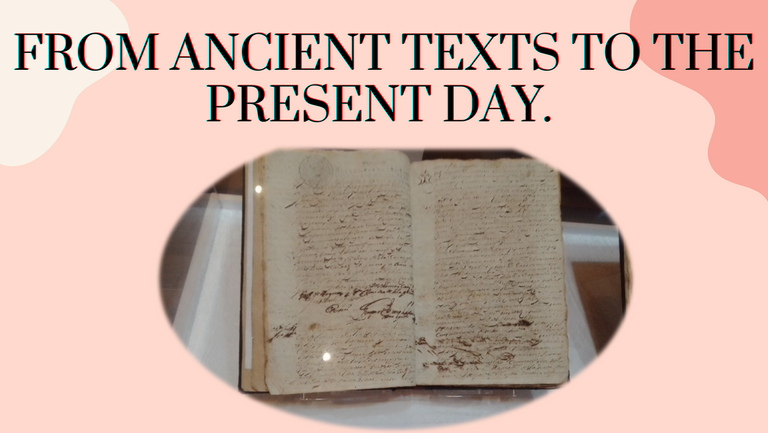
Welcome everyone to this new post which has as its main point the ability to show part of one of my visits to the PDVSA area the stay where on this occasion they made an exhibition of old books of high cultural value as historical.
Therefore, as some of you will know, before the digital book there were writings on stone, then it evolved to paper until what we know today as intangible books that we cannot touch but read through different digital devices.
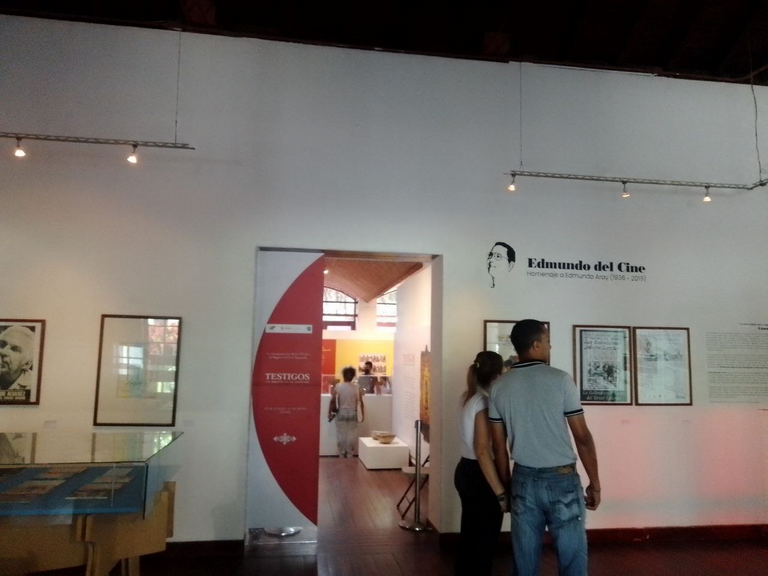 | 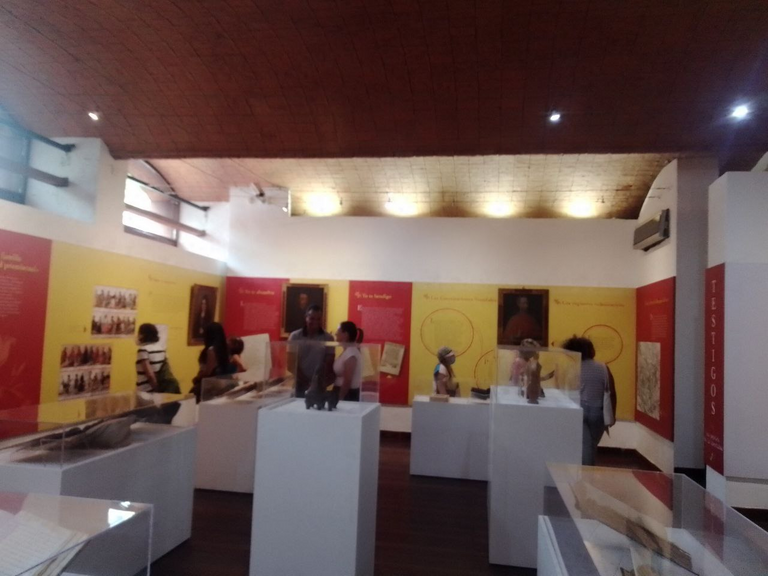 | 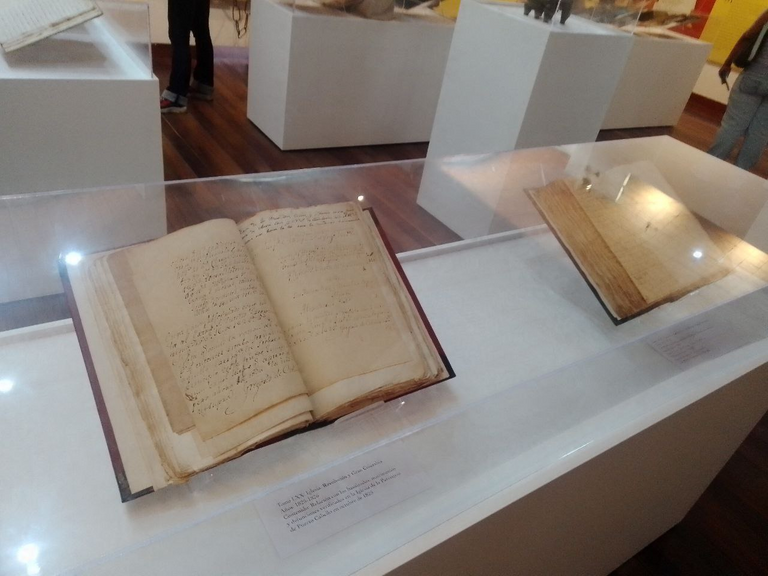 |
|---|
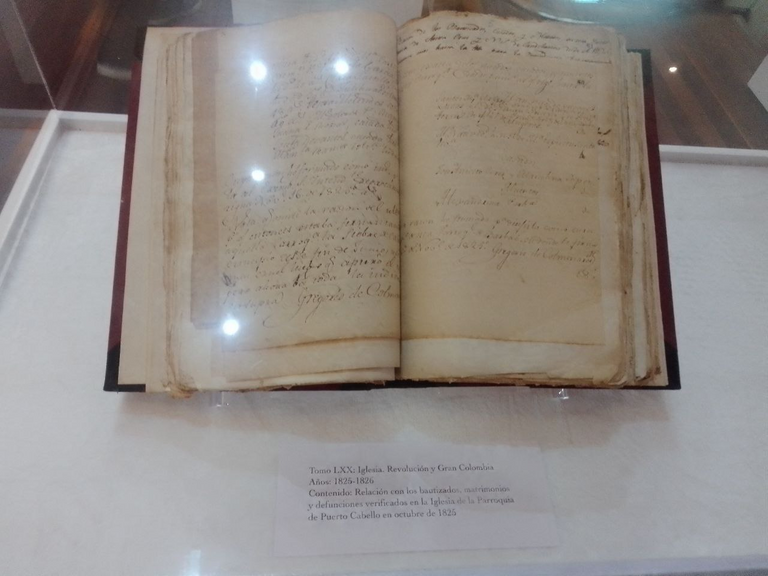 | 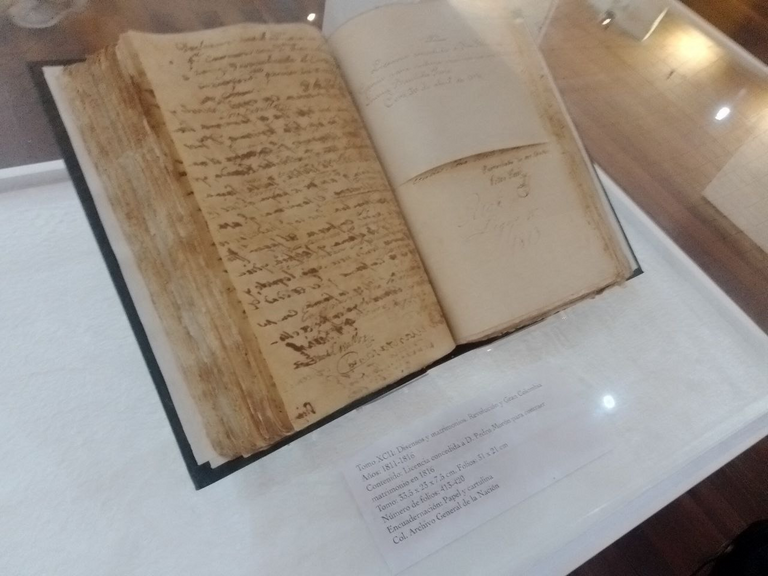 |
|---|
From my perspective, I am very excited to see the great interest of people of all ages in learning about texts that have never been shown before, due to their great antiquity in what is known as the history of Venezuela; an example of this is being able to appreciate one of the many volumes that were carried by the church of the records of marriages, baptisms and deaths for the year 1825 to 1826 of the geographical area of the state of Puerto Cabello.
Its importance over the years lies in the fact that this old book provides the record on personal data in terms of the union of families of low, middle and high class through the ritual of marriage and in terms of the deaths that occurred, a large number of investigations can be carried out on the recurrent causes of death, which were mostly caused by diseases and the unfavorable conditions in which people lived; In addition, for those who want to know their genealogical record, this volume provides great information.
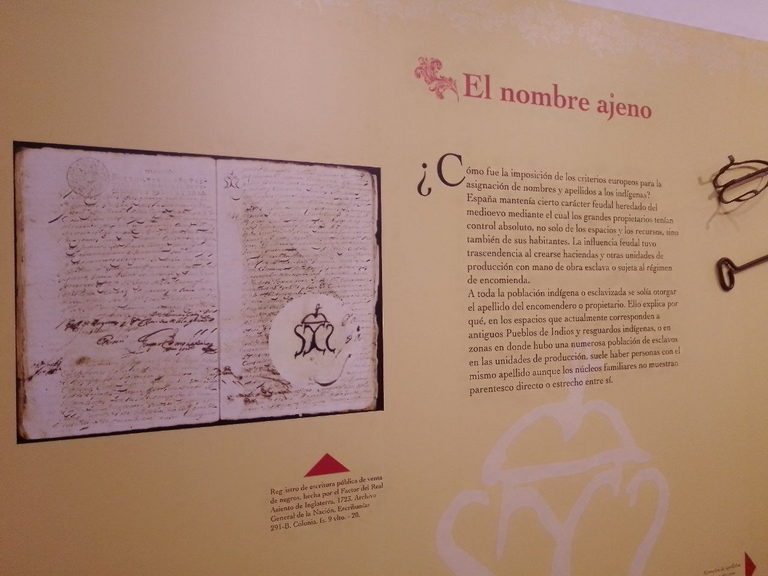
I found it clever that the walls of the exhibition were covered with written fragments of highly relevant books. A notable example is the public writing record of blacks and indigenous people, carried out by the Factor of the Real Seat of England. This record becomes very important for history, since in its pages it shows how the owners or encomenderos of the land assigned surnames to the indigenous and black labor force according to the place where they worked.
This fragment of the wall, which contains information about slavery in Latin America, has generated great interest among young people. By understanding how this system developed and how the owners of the land treated their indigenous and black workers, you can better understand the history and culture of the region and its relationship with colonialism. In addition, it highlights how the surnames that were assigned to these people influenced their identity and culture, making it evident the importance of recognizing and valuing the cultural and ethnic diversity of Latin America today.
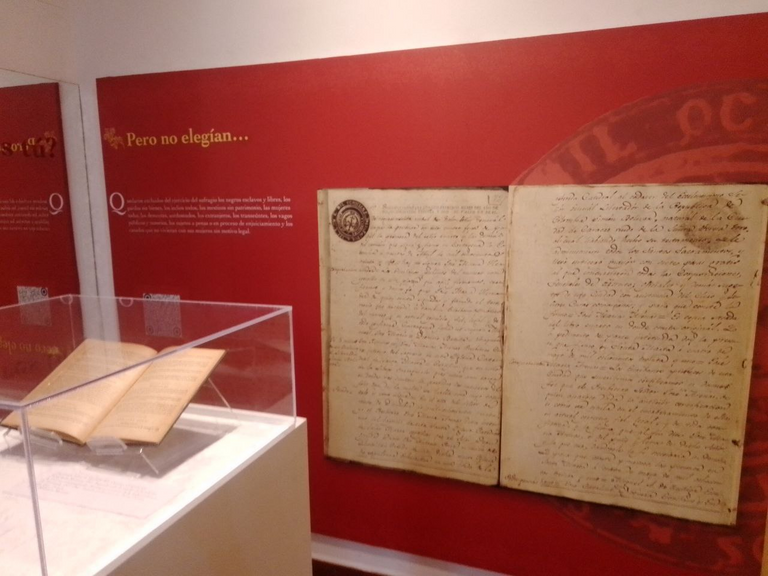
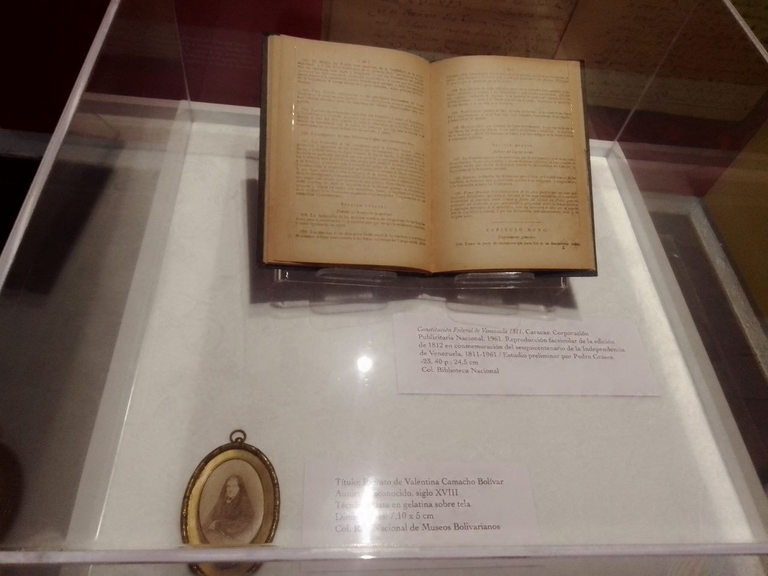
A work of great interest to all Venezuelans is the replica of the Federal Constitution of Venezuela. This fundamental text establishes the rights, duties and behavior of citizens, and is essential to understand the legal basis of the country's legal system. Through the different modifications, the Constitution has evolved to protect and promote the welfare and justice of citizens.
In addition, this legal text is used as a point of comparison with other legal norms abroad, which allows for a better understanding of the ideas written years ago. In summary, the Federal Constitution of Venezuela is a key piece to understand the history and culture of the country, as well as to value the importance of citizen rights and duties in the present.
PROGRESS TODAY
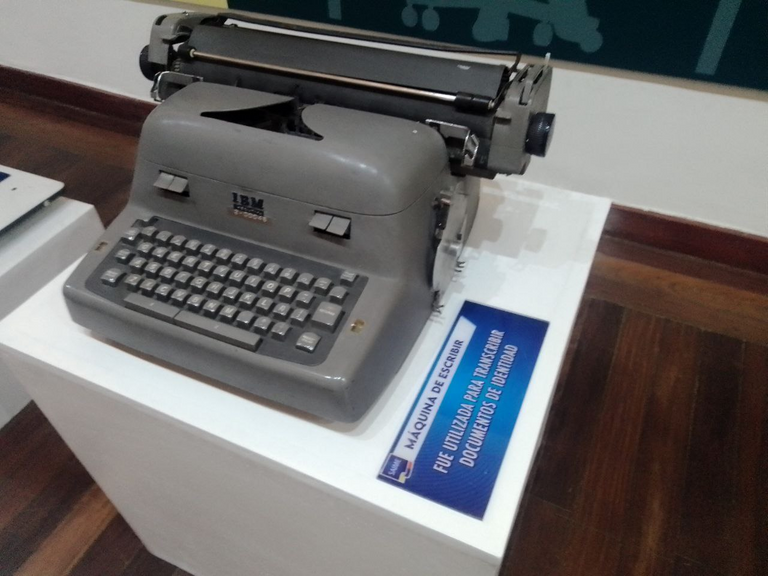
The arrival of the typewriter to Venezuela at the end of the 19th century and the beginning of the 20th century meant a real revolution in the production of written documents. In a short time, this tool became a key piece for the realization of faster and more efficient work, which made it an essential tool. Its importance was so relevant that it began to be used for the preparation of identity documents, such as birth certificates, identity cards and death certificates, as well as for the updating of legal texts. Thanks to the typewriter, writing and the production of documents were greatly simplified in Venezuela.
- How did the arrival of the typewriter affect education and the workplace?
It could be indicated that since the arrival of the typewriter this generated a significant impact on the education and culture of the country, since the possibility of producing written documents more quickly and efficiently allowed a greater diffusion of information and knowledge. Among the main benefits is that it improved the quality of written documents, which benefited both students and professionals from various areas.
In the educational field, the typewriter allowed teachers and professors to produce didactic material more efficiently and with greater quality. In addition, the ease of producing written documents also improved the process of evaluating students.
On the other hand, it is well known that it allowed a greater diffusion of literature and the production of printed material more efficiently. What generated over time the creation of publishing houses and the publication of newspapers, magazines and books at a more accelerated pace, thus promoting educational, cultural and scientific development, in addition to freedom of expression.
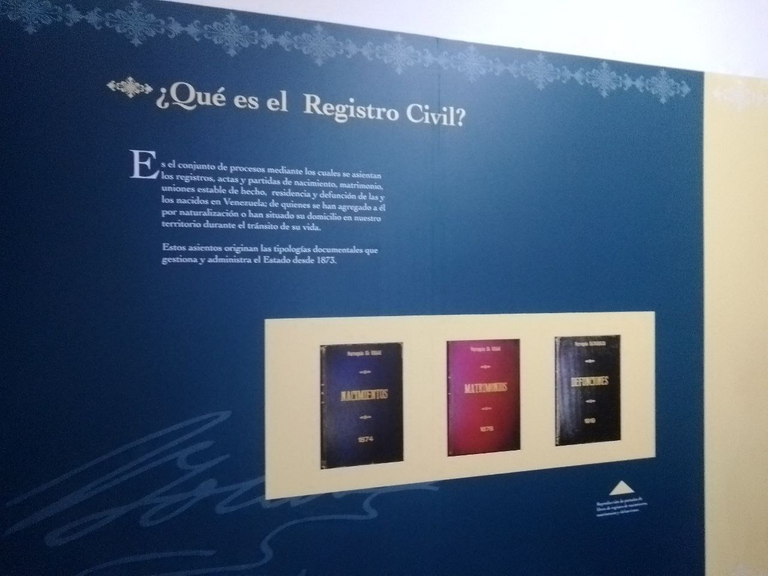 | 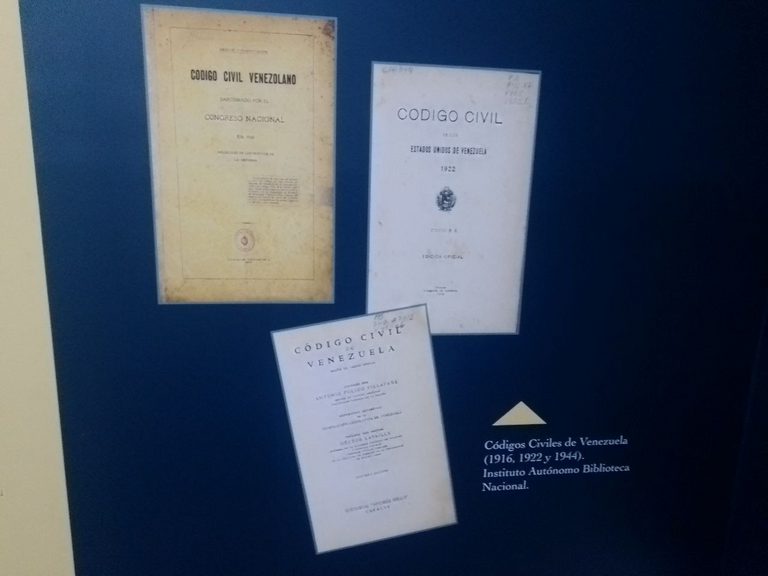 |
|---|
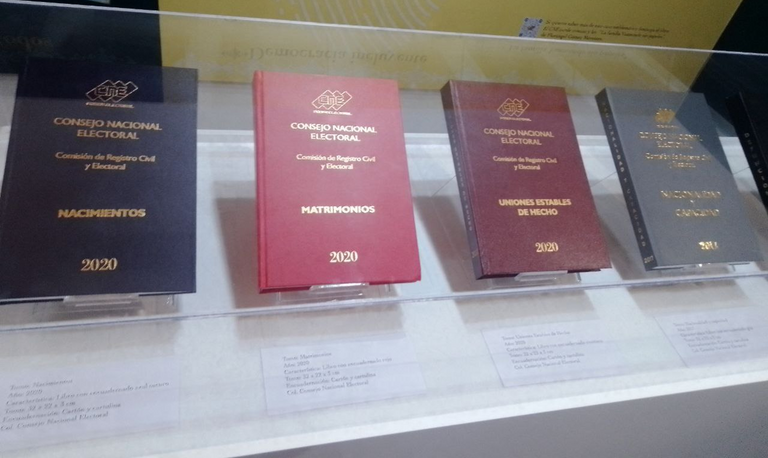
At the end of the tour of the exhibition, several volumes and editions of the books containing the National Electoral Council's register were displayed. These books are of great importance for the election of the country's president, as well as the governors of each state. The exhibition of these books allowed the public to know the relevance of the electoral register and its fundamental role in the democratic process.
It is important to highlight that the electoral register is the means by which citizens exercise their right to vote and choose their representatives. Therefore, the exhibition of these volumes and editions promotes transparency and confidence in the electoral process, by allowing citizens to know firsthand the electoral register and its importance in the election of their leaders.
CONCLUSION
In my opinion, the exhibition at the PDVSA La Estancia facilities was extremely enriching, as it allowed young people, children and adults to appreciate an important part of Venezuela's history through the different types of book specimens exhibited. Among them, the national electoral register and the federal constitution of Venezuela of 1811 stand out, which demonstrate how books carry with them information of great relevance and are the texts that shape the behavior of citizens in different times.
In addition, the exhibition allowed to know the register of the families that at some time were relevant for the history of the country and that today they can still be part of the old lineage of some people. It is impressive how books preserve the historical memory of a country and how its content can be of great interest to new generations.
SPANISH VERSION
Bienvenidos sean todos a esta nueva publicación la cual tiene como principal punto el poder mostrar parte de una de mis visitas al área de PDVSA la estancia donde en esta ocasión realizaron una exposición de libros antiguos de alto valor cultural como histórico.
Por lo tanto como algunos sabrán, antes del libro digital estaban las escrituras en piedra, luego fue evolucionando al papel hasta lo que hoy conocemos como los libros intangibles que no podemos tocar pero si leer a través de los distintos dispositivos digitales.
 |  |  |
|---|
 |  |
|---|
Desde mi perspectiva me genero una gran emoción el ver el gran interés de las personas de todas las edades por conocer los textos nunca antes mostrados, por su gran antigüedad de lo que se conoce como la historia de Venezuela; ejemplo de ello es el poder apreciar uno de los tantos tomos que eran llevados por la iglesia de los registros de los matrimonios, bautismos y defunciones para el año de 1825 a 1826 del área geográfica del estado de Puerto Cabello .
Su importancia a través de los años radica en que este libro antiguo suministra el registro sobre los datos personales en cuento a la unión de familias de baja, mediana y alta clase por medio del ritual del casamiento y en cuanto a la defunciones ocurridas se pueden realizar un gran numero de investigaciones sobre las recurrentes causas de muerte, que eran mayormente causadas por enfermedades y las condiciones desfavorables en las cuales se vivía; además para quien busca saber su registro genealógico dicho tomo suministra gran información.

En segundo lugar, encontré ingenioso que las paredes de la exposición estuvieran cubiertas con fragmentos escritos de libros de gran relevancia. Un ejemplo notable es el registro de escritura pública de negros e indígenas, realizado por el Factor del Real Asiento de Inglaterra. Este registro adquiere gran importancia para la historia, ya que en sus páginas se muestra cómo los propietarios o encomenderos de la tierra asignaban apellidos a la mano de obra indígena y negra según el lugar donde trabajaban.
Este fragmento de la pared, que contiene información sobre la esclavitud en América Latina, ha generado gran interés entre los jóvenes. Al comprender cómo se desarrolló este sistema y cómo los propietarios de las tierras trataban a sus trabajadores indígenas y negros, se puede entender mejor la historia y la cultura de la región y su relación con el colonialismo. Además, se destaca cómo los apellidos que se les asignaron a estas personas influyeron en su identidad y cultura, lo que hace evidente la importancia de reconocer y valorar la diversidad cultural y étnica de América Latina en la actualidad.


Una obra de gran interés para todos los venezolanos es la réplica de la Constitución Federal de Venezuela. Este texto fundamental establece los derechos, deberes y comportamiento de los ciudadanos, y es esencial para comprender las bases legales del ordenamiento jurídico del país. A través de las distintas modificaciones, la Constitución ha evolucionado para proteger y velar por el bienestar y la justicia de los ciudadanos.
Además, este texto legal es utilizado como punto de comparación con otras normas legales en el exterior, lo que permite una mejor comprensión de las ideas escritas hace años. En resumen, la Constitución Federal de Venezuela es una pieza clave para entender la historia y la cultura del país, así como para valorar la importancia de los derechos y deberes ciudadanos en la actualidad.
PROGRESO HACIA LA ACTUALIDAD

La llegada de la máquina de escribir a Venezuela a finales del siglo XIX y principios del siglo XX supuso una auténtica revolución en la producción de documentos escritos. En poco tiempo, esta herramienta se convirtió en una pieza clave para la realización de trabajos más rápidos y eficientes, lo que la convirtió en una herramienta esencial. Su importancia fue tan relevante que se empezó a utilizar para la elaboración de documentos de identidad, como actas de nacimiento, cédulas y actas de defunción, así como para la actualización de textos legales. Gracias a la máquina de escribir, la escritura y la producción de documentos se simplificaron enormemente en Venezuela.
- ¿Cómo afectó la llegada de la máquina de escribir a la educación y el ámbito laboral?
Se podría indicar que desde la llegada de la máquina de escribir esta generó un impacto significativo en la educación y la cultura del país, puesto que la posibilidad de producir documentos escritos de manera más rápida y eficiente permitió una mayor difusión de la información y el conocimiento. Entré los principales beneficios es que mejoró la calidad de los documentos escritos, lo que benefició tanto a los estudiantes como a los profesionales de diversas áreas.
En el ámbito educativo, la máquina de escribir permitió a los maestros y profesores producir material didáctico de manera más eficiente y con mayor calidad. Además, la facilidad para producir documentos escritos también mejoró el proceso de evaluación de los estudiantes.
Por otra parte es bien conocido que permitió una mayor difusión de la literatura y la producción de material impreso de manera más eficiente. lo que genero con el tiempo la creación de editoriales y la publicación de periódicos, revistas y libros a un ritmo más acelerado fomentando así el desarrollo educativo, cultural y científico además de la libertad de expresión.
 |  |
|---|

Al finalizar el recorrido por la exposición, se exhibieron varios tomos y ediciones de los libros que contienen el registro del Consejo Nacional Electoral. Estos libros son de gran importancia para la elección del presidente del país, así como de los gobernadores de cada estado. La exhibición de estos libros permitió al público conocer la relevancia del registro electoral y su papel fundamental en el proceso democrático.
Es importante destacar que el registro electoral es el medio por el cual los ciudadanos ejercen su derecho al voto y eligen a sus representantes. Por lo tanto, la exhibición de estos tomos y ediciones fomenta la transparencia y la confianza en el proceso electoral, al permitir a los ciudadanos conocer de cerca el registro electoral y su importancia en la elección de sus líderes.
CONCLUSIÓN
En mi opinión, la exposición en las instalaciones de PDVSA La Estancia fue sumamente enriquecedora, ya que permitió a jóvenes, niños y adultos apreciar una parte importante de la historia de Venezuela a través de los diferentes tipos de ejemplares de libros exhibidos. Entre ellos, destacan el registro nacional electoral y la constitución federal de Venezuela de 1811, que demuestran cómo los libros llevan consigo información de gran relevancia y son los textos que moldean el comportamiento de los ciudadanos en diferentes épocas.
Además, la exposición permitió conocer el registro de las familias que alguna vez fueron relevantes para la historia del país y que hoy en día pueden seguir siendo parte del linaje antiguo de algunas personas. Es impresionante cómo los libros conservan la memoria histórica de un país y cómo su contenido puede ser de gran interés para las nuevas generaciones.
Nota: Todo el contenido es original y de mi propiedad, las fotografías fueran tomadas desde mi teléfono particular Alcatel 1Se modelo 5030.
- Fotografía y edición de presentación: Canva.
Note: All the content is original and my property, the pictures were taken from my Alcatel 1Se model 5030 home phone.
-Photography and presentation editing: Canva.
Qué linda exposición, es genial ver los libros antiguos en esas ediciones amarillas y decoloradas, son perfectas obras de arte. Me encanta saber que todavía se pueden apreciar estos pedazos de historias en páginas, y saber que hay personas que disfrutan ir a verlos y conocer sobre ellos. ¡Gracias por compartir!
Gracias a ti por leer la publicación y ver por medio de los libros en exhibiciones parte de la historia de Venezuela.